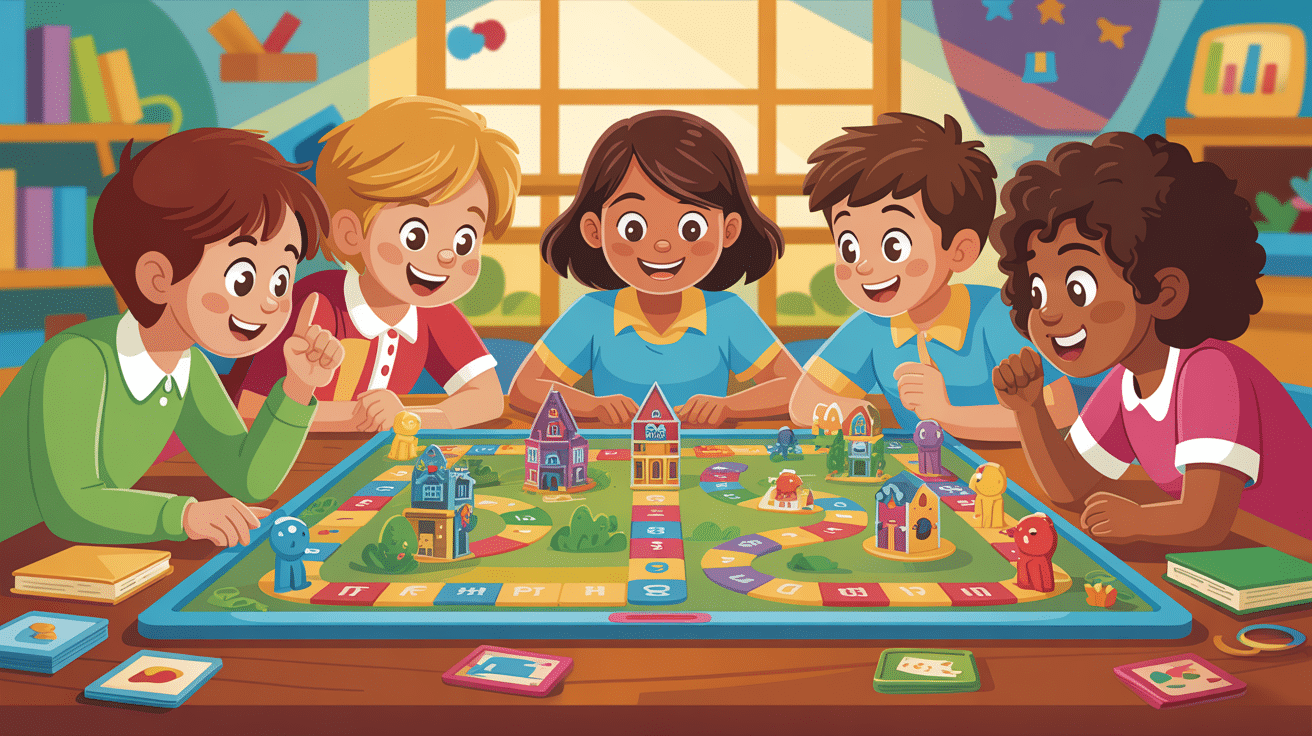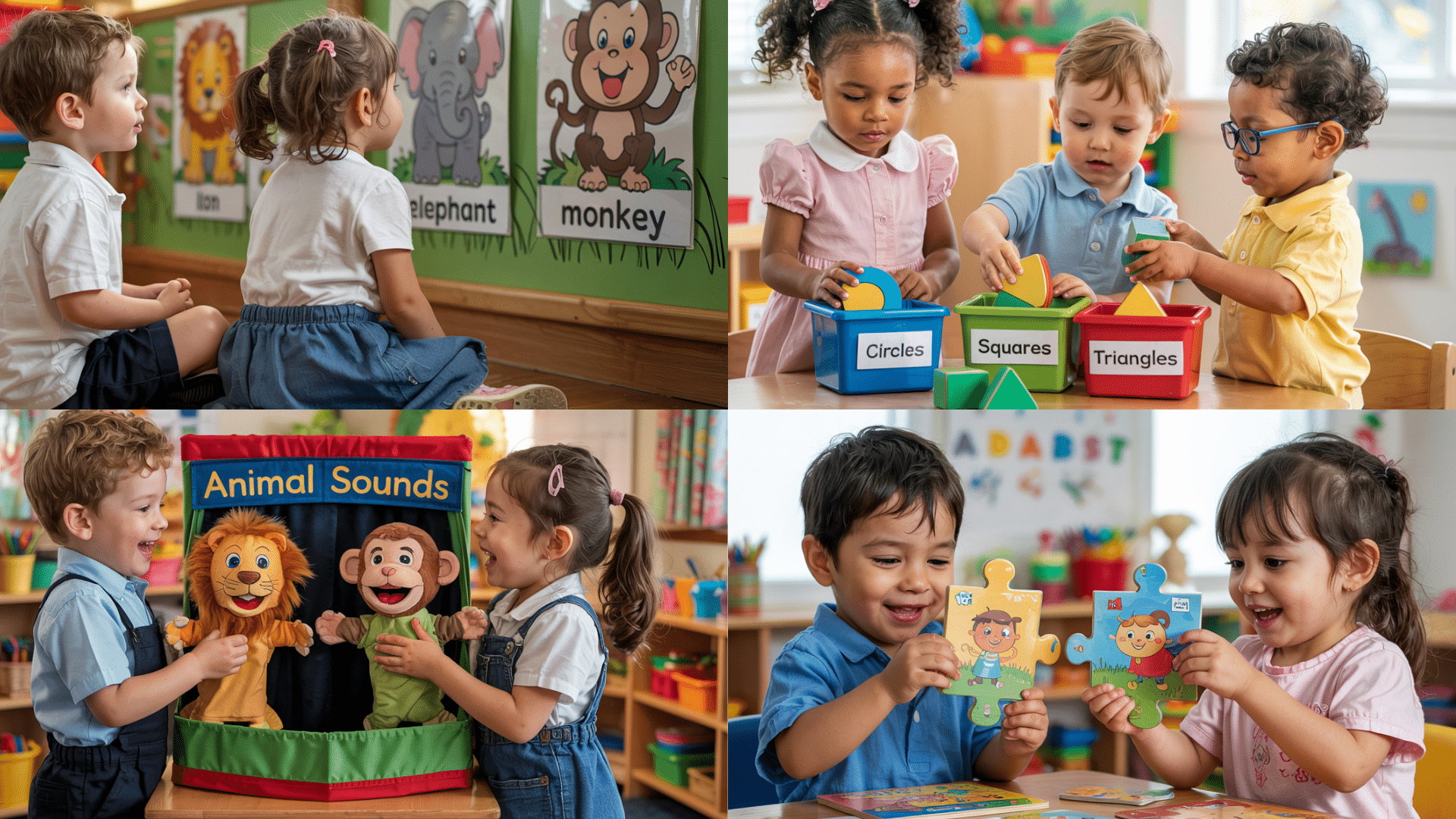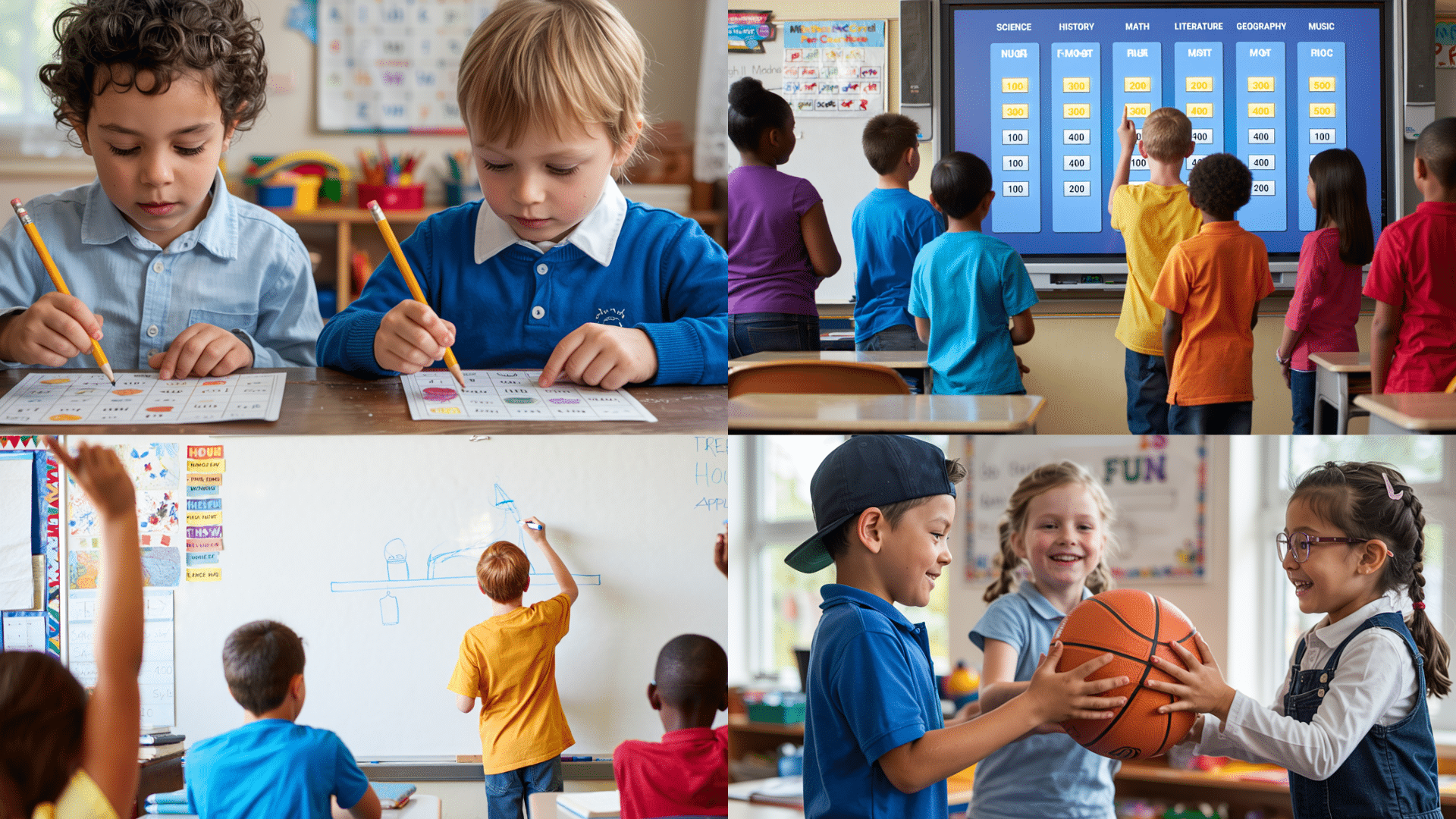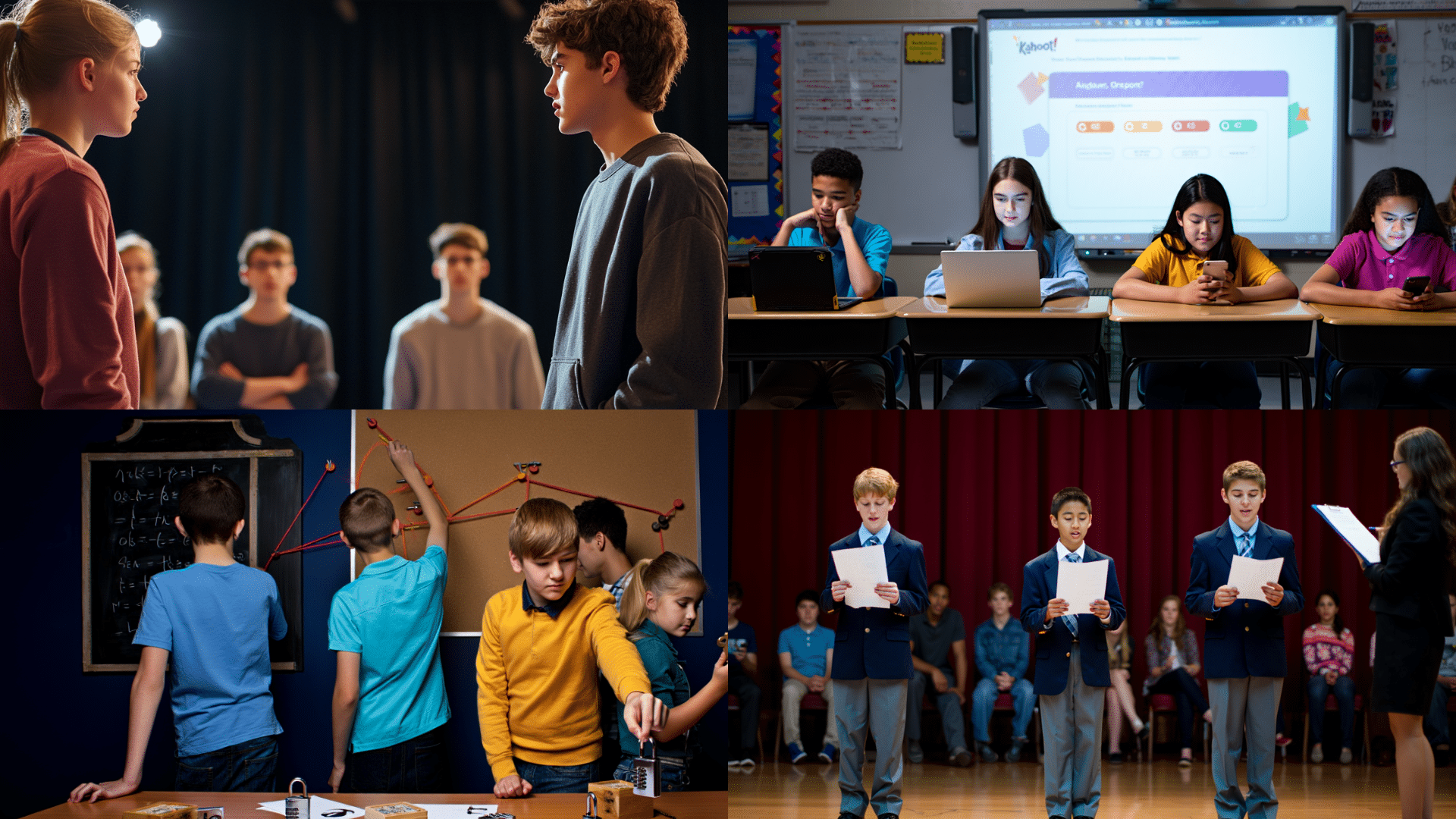Do teachers notice their students’ eyes glazing over during review sessions? This common classroom issue affects learning outcomes for kindergarteners through high school students.
Good news! The solution lies in turning review time into play time.
Fun review games make study sessions more effective by boosting student focus and memory retention. They create a positive classroom mood that helps information stick.
This blog shows simple ways to get students excited about review time. From quick card games for kindergarteners to team challenges for teens, these methods work across all age groups. They need little prep time but bring big results.
Ready to make test prep something your students look forward to? Keep reading to find games that will have your class begging for more review time!
What Makes a Review Game Engaging and Fun?

The best classroom activities combine learning with excitement. Here are five key elements that make review activities work well:
- Clear rules: Keep instructions simple and quick to explain so students can start playing right away without confusion.
- Fair competition: Design games where all students can succeed, not just the ones who already know the material well.
- Active movement: Include physical actions that get students out of their seats to boost energy levels and help with focus.
- Quick pace: Structure activities with short rounds that move quickly to maintain attention and give many chances to participate.
- Small rewards: Offer simple prizes like stickers or bonus points that motivate without making the stakes too high for comfort.
These five elements help create fun review games that students will ask to play again and again.
Easy Review Games for Kindergarteners: A New Way to Learn

Reviewing key concepts through engaging activities is an exciting way to reinforce learning for young minds. Here are some easy review games to get your kindergarteners involved in fun, hands-on learning experiences:
1. Color Match Challenge
In this game, children match different colored objects to their respective color cards to reinforce color recognition. It’s simple yet effective, helping them visually connect items with colors.
- What you’ll need: Colorful cards, colored objects
- No. of children: 2-4
- How to play: Lay out color cards and give children corresponding colored objects to match. Once matched, they say the color aloud.
2. Animal Sound Hunt
This game engages children’s listening skills while reinforcing animal sounds. Kids must listen for the sound of an animal and then race to find a picture of that animal.
- What you’ll need: Animal sound recordings or toys
- No. of children: 3-5
- How to play: Play an animal sound and have children find the animal picture associated with the sound.
3. Number Relay Race
This fun game uses movement to review numbers. Children run to a number, pick it up, and race back to the start to place it in the correct order.
- What you’ll need: Number cards, large space to run
- No. of children: 4-6
- How to play: Scatter number cards around the room. Kids take turns racing to grab a number and return it in sequence.
4. Shape Sorting Station
Children practice identifying shapes by sorting them into the correct containers. This is a great tactile way to reinforce shape recognition.
- What you’ll need: Different shaped objects, sorting containers
- No. of children: 2-4
- How to play: Children will sort the objects into containers based on shape, calling out the shapes as they do it.
5. Letter Hopscotch
A twist on the classic game, where children hop to letters instead of numbers, reinforcing letter recognition and physical coordination.
- What you’ll need: Chalk or tape, letter cards
- No. of children: 2-4
- How to play: Lay down a hopscotch grid with letters instead of numbers. Children hop from one letter to the next, saying the letter aloud.
6. Scavenger Hunt: Classroom Edition
A scavenger hunt that challenges children to find objects related to the concepts they’ve learned, from shapes to colors and letters.
- What you’ll need: A list of items to find
- No. of children: 2-6
- How to play: Give children a list of items to find around the classroom, with each item linked to a learning concept.
7. Puppet Show Review
Using puppets, children practice new vocabulary or concepts by having the puppets act out simple scenarios or answer questions.
- What you’ll need: Puppets, script or questions
- No. of children: 2-4
- How to play: Children use puppets to act out answers to review questions or concepts, performing for each other.
8. Puzzle Piece Match-Up
This game focuses on matching pieces of a puzzle with corresponding concepts, such as matching animals to their homes or numbers to quantities.
- What you’ll need: Puzzle pieces with concepts or pictures
- No. of children: 2-4
- How to play: Children match puzzle pieces together based on the correct connections, such as animals to their habitats.
9. Flashcard Flip
Children practice identifying pictures or words by flipping through flashcards and racing to call out the correct answer.
- What you’ll need: Flashcards with pictures or words
- No. of children: 2-4
- How to play: Hold up a flashcard and have children call out what they see. The child who answers first wins the round.
10. Counting Cup Challenge
A hands-on counting activity where children practice counting by placing objects into cups, ensuring they have the correct number.
- What you’ll need: Small objects (e.g., buttons, beans), cups
- No. of children: 3-4
- How to play: Give children a number, and they must count that amount of objects into the corresponding cup.
These fun review games will keep your kindergarteners excited about learning while reinforcing key concepts. Use them to bring energy and creativity into every lesson, helping kids master essential skills in an interactive way!
Creative Review Games for Student Engagement: Elementary Edition

Engaging elementary students through creative review games helps them actively recall information in a fun and memorable way.
Here are some fun review games designed to keep students excited while reinforcing essential lessons:
11. Jeopardy Review
In this game, students answer questions in a quiz-style format, choosing categories and points to compete against their classmates. It fosters teamwork while reinforcing knowledge.
- What you’ll need: Jeopardy-style question board, buzzer
- No. of children: 4-6
- How to play: Students take turns choosing questions from the board. They answer to earn points, and the team with the highest score wins.
12. Word Bingo
A twist on the classic bingo game where students mark off words they recognize or spell correctly. This game promotes vocabulary recognition and spelling skills.
- What you’ll need: Bingo cards with words, markers
- No. of children: 4-8
- How to play: Call out words for students to mark on their bingo cards. The first to get a full row wins.
13. Spin the Wheel Review
A fun and interactive game where students spin a wheel to land on different topics for a quick review, encouraging students to recall information from various subjects.
- What you’ll need: Spinning wheel, topics or questions
- No. of children: 4-6
- How to play: Students take turns spinning the wheel, landing on different subjects, and answering the related question or task.
14. Memory Match Game
Students work in pairs to match related concepts, such as words to definitions or problems to answers, reinforcing their memory and learning.
- What you’ll need: Memory cards with matching concepts
- No. of children: 2-4
- How to play: Lay cards face down. Students take turns flipping two cards to find matching pairs.
15. Pictionary Review
In this drawing game, students take turns drawing clues related to lesson content while their team guesses the word. It helps with visual recall and teamwork.
- What you’ll need: Paper, markers
- No. of children: 4-8
- How to play: One student draws a concept or word, and the team guesses. Each correct guess earns points.
16. Hot Potato Q&A
A fun, fast-paced game where students pass a ball or object while answering review questions. The student holding the object when the music stops must answer a question.
- What you’ll need: Ball or soft object, music
- No. of children: 4-6
- How to play: Play music while students pass the object. When the music stops, the student holding the object answers a question.
These fun review games provide engaging ways for elementary students to reinforce what they’ve learned in a creative and interactive manner!
Interactive Review Games for High-School Students

Engaging high-school students in fun review games can deepen their understanding of challenging material. These games combine learning with hands-on activities, making review sessions versatile and exciting:
17. Escape Room Challenge
This exciting game immerses students in an escape room scenario where they must solve academic puzzles to “escape” in time. It promotes teamwork, critical thinking, and quick recall of information.
- What you’ll need: Puzzles, clues, timer
- No. of children: 4-8
- How to play: Divide students into teams. They must work together to solve puzzles related to the lesson to find clues and escape before time runs out.
18. Kahoot! Quiz Show
Kahoot! is an interactive online quiz platform where students can answer questions in a competitive and fast-paced environment. It’s ideal for reviewing concepts in a fun and engaging way.
- What you’ll need: Computers, tablets, or smartphones
- No. of children: 5-10
- How to play: The teacher creates a quiz on Kahoot!, and students use devices to answer the questions. Points are awarded for speed and accuracy.
19. Debate Showdown
In this game, students prepare arguments on a topic, presenting their points and counterpoints in a structured debate. It helps develop their critical thinking and public speaking skills.
- What you’ll need: Debate topics, timer
- No. of children: 4-6
- How to play: Divide students into teams, each taking a side of a topic. They will present their arguments within a time limit, followed by a rebuttal from the opposing team.
20. Trivia Wheel of Knowledge
This fun review game has students spin a wheel to answer questions from various subjects. The random nature adds excitement, while the questions review key concepts.
- What you’ll need: Spinning wheel, trivia questions
- No. of children: 4-6
- How to play: Students spin the wheel to land on different subjects. They must answer a question from that subject. Correct answers earn points.
21. Spelling Bee Challenge
In this game, students are tested on their ability to spell words related to the subject material. This is a great review game for subjects that involve heavy vocabulary.
- What you’ll need: List of words, timer
- No. of children: 6-8
- How to play: Students take turns spelling words aloud. The teacher reads words, and each student has a limited time to spell it correctly.
These fun review games for high-school students help make learning more enjoyable, encouraging engagement and deeper understanding!
Wrapping It Up
Fun review games work because they mix learning with joy.
They help students stay focused and remember facts better than plain study sessions. The ideas we shared fit all grade levels from kindergarten to high school, letting you pick what suits your students best.
When you use games for test prep, you create happy classroom memories while building knowledge. This makes students more likely to use what they learn later on.
Have you tried any of these games in your classes? What worked well for your students?
Share your thoughts in the comments section below! Your ideas might help another teacher find the perfect way to make review time more fun for their students too.




